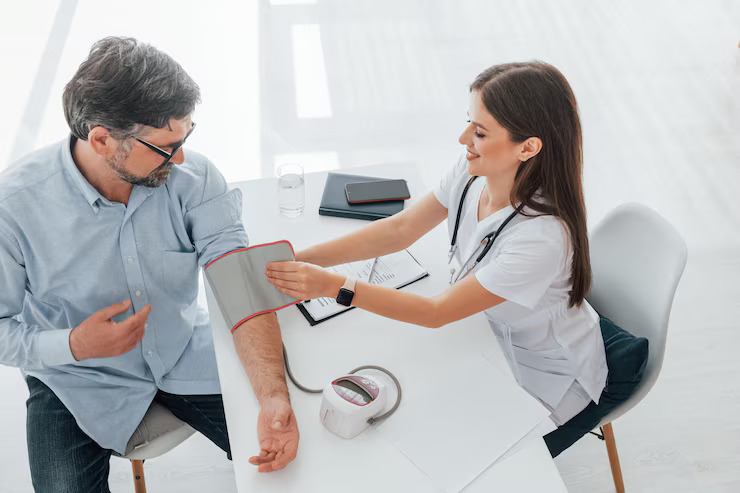High blood pressure, or hypertension, is often called the “silent killer” because it frequently presents without noticeable symptoms. However, if left unmanaged, it can lead to severe health complications, including heart attack, stroke, kidney failure, and even a hypertensive emergency—a dangerously high blood pressure reading that requires immediate medical attention. While primary care physicians manage long-term hypertension, urgent care clinics play a critical, often overlooked, role in preventing these emergencies by providing timely assessment and intervention.

The Threat of Uncontrolled Blood Pressure
Blood pressure is the force of blood pushing against the walls of your arteries. When this force is consistently too high, it puts undue strain on your cardiovascular system. A hypertensive emergency is typically defined as a systolic blood pressure (the top number) of 180 mmHg or higher, or a diastolic blood pressure (the bottom number) of 120 mmHg or higher, accompanied by signs of organ damage (e.g., severe headache, blurred vision, chest pain, shortness of breath, numbness/weakness). A hypertensive urgency involves similar high readings but without immediate organ damage. Both require prompt medical attention to prevent progression to an emergency.
Urgent Care: A Crucial First Line of Defense
Urgent care clinics are uniquely positioned to intervene when blood pressure readings are alarmingly high but have not yet escalated into a full-blown emergency. Here’s how they help:
1. Immediate Assessment and Monitoring:
- Walk-in Access: Patients can walk in without an appointment, making it easy to get immediate attention for concerning blood pressure readings.
- Rapid Vitals: Staff quickly take blood pressure readings, and if they are elevated, they will often re-check them after a brief rest period to ensure accuracy.
- Symptom Evaluation: The urgent care team will assess for symptoms that indicate potential organ damage (e.g., severe headache, vision changes, chest pain, shortness of breath, dizziness), helping to differentiate between a hypertensive urgency and emergency.
2. Timely Intervention and Stabilization:
- Medication Adjustment/Initiation: For patients with known hypertension whose blood pressure is spiking, the urgent care physician may adjust current medications or prescribe new ones to safely lower the blood pressure.
- New Diagnoses: For individuals unaware they have high blood pressure, an urgent care visit can be the first step to diagnosis. They can initiate a treatment plan to bring the numbers down to a safer range.
- Observation: In cases of hypertensive urgency, patients may be observed for a few hours to ensure their blood pressure responds to medication and stabilizes, preventing an emergency room visit.
3. Education and Lifestyle Guidance:
- Understanding Readings: Urgent care staff can explain what high blood pressure readings mean and the immediate risks.
- Lifestyle Recommendations: They often provide crucial advice on lifestyle modifications, such as dietary changes (reducing sodium), regular exercise, stress management, and smoking cessation, which are vital for long-term blood pressure control.
- Medication Adherence: For those already on medication, they can reinforce the importance of consistent adherence.
4. Referral and Follow-Up:
- Primary Care Connection: Urgent care clinics serve as a bridge to long-term care. After stabilizing a patient’s blood pressure, they will strongly recommend follow-up with a primary care physician for ongoing management.
- Specialist Referrals: If underlying conditions are suspected or specialist care is needed (e.g., for kidney issues or cardiology), they can provide referrals.
- Emergency Transfer: Crucially, if the urgent care team identifies signs of a true hypertensive emergency (e.g., severe organ damage), they are equipped to facilitate immediate transfer to an emergency room for more intensive care.
When to Visit Urgent Care for Blood Pressure Concerns
Consider visiting an urgent care clinic if:
- Your blood pressure readings are consistently high (e.g., 140/90 mmHg or higher) and you don’t have a primary care doctor or can’t get an immediate appointment.
- Your blood pressure suddenly spikes (e.g., 180/110 mmHg) but you don’t have symptoms of organ damage.
- You have mild symptoms like a headache or dizziness along with elevated blood pressure, but no severe, acute symptoms.
- You are concerned about your blood pressure and need a quick check and advice.
Conclusion
Urgent care clinics play an indispensable role in the proactive management of high blood pressure, acting as a critical safeguard against life-threatening hypertensive emergencies. By offering accessible, immediate assessment, timely intervention, patient education, and appropriate referrals, they help individuals stabilize dangerously high readings before they cause irreversible damage. Recognizing the signs of concerning blood pressure and knowing when to utilize urgent care can be a vital step in protecting your cardiovascular health and preventing a medical crisis.
FAQs
1. What is considered a dangerously high blood pressure reading?
A blood pressure reading of 180/120 mmHg or higher is considered dangerously high. If accompanied by symptoms of organ damage, it’s a hypertensive emergency.
2. Can urgent care prescribe medication for high blood pressure?
Yes, urgent care physicians can prescribe medication to lower blood pressure, especially if readings are acutely elevated. They will also recommend follow-up with a primary care provider for long-term management.
3. Should I go to the ER or urgent care for high blood pressure?
If you have a blood pressure of 180/120 mmHg or higher with symptoms of organ damage (e.g., severe headache, chest pain, vision changes, numbness), go to the ER. If you have high readings without these severe symptoms, urgent care is often appropriate.
4. How often should I check my blood pressure if I have hypertension?
Your doctor will provide specific guidance, but generally, if you have hypertension, you should monitor your blood pressure regularly at home, as advised by your healthcare provider.
5. What lifestyle changes can help manage blood pressure?
Key lifestyle changes include a low-sodium diet, regular physical activity, maintaining a healthy weight, limiting alcohol, quitting smoking, and managing stress.
Visit our website https://sccplano.com/locations/east-plano/ today to learn more about our comprehensive urgent care services, or call us (972) 633-8747 directly to schedule a consultation. Our team is ready to provide the immediate care and guidance you need for your blood pressure concerns and overall health.
